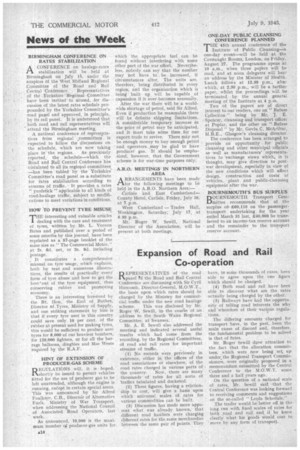Expansion of Road and Co-operation Rail
Page 16

If you've noticed an error in this article please click here to report it so we can fix it.
REPRESENTATIVES of the road panel tf the Road and Rail Central Conference are discussing with Sir Cyril Hurcornb, Director-General, M.O.W.T., the basis upon which rates should be charged by the Ministry for commercial traffic under the new road haulage
scheme. This was disclosed by Mr. Roger W. Sewill, in the coufse of an address to the South Wales Regional Committee, at Swansea: Mr. A, E, Sewell also addressed the meeting and indicated several useful -results which had come . from the recording, by the Regional Committees, of road and rail rates for important streams of traffic. .
(1) No records were previously in existence, either in the offices of the' road associations or elsewhere, of the road rates charged in various parts of the country. Now, there are many' thousands of rates for all sorts of 'traffics tabulated and docketed.
(2) These figures, having a relationship to cost, will give a basis upon which universal scales of rates for various commodities can be built. (3) Discussion has made more apparent what was already known, that different road hauliers were charging different rates for the same merchandise b'etween the same pair of points. They have, in' sonic thousands of cases, been,able to agree upon the one figure • which should be charged. (4) Both road and rail have been able to discover what are the rates actually being charged by the other'.
(5) Railways have had the •opportit• nity of telling road interests the why and wherefore of their various regulations.
The differing amounts charged for transport have, in the past, been the main cause of discord and, therefore, the fundamental problem to be solved is that of i'ates.
Mr. Roger Sewill drew attention to the fact that the allocation committees, which were now being set up under_ the Regional Transport Commissioners, were originally proposed in a memorandum submitted by the Central Conference to the M.O.W.T. some three and a half years ago. On the question of a national scale of rates, Mr. Sewill skid that the Central Conference was looking forward to receiving comments and suggeStions on the so-called " Leeds Schedule."
The trader would be better off in the long run with fixed scales of rates for both road and rail and if he knew clearly what his goods would cost to ' move by any .form of transport.




















































